人教版(2019)必修 第一册Unit 2 Travelling around Video Time-教学课件(共26张PPT)
文档属性
| 名称 | 人教版(2019)必修 第一册Unit 2 Travelling around Video Time-教学课件(共26张PPT) |
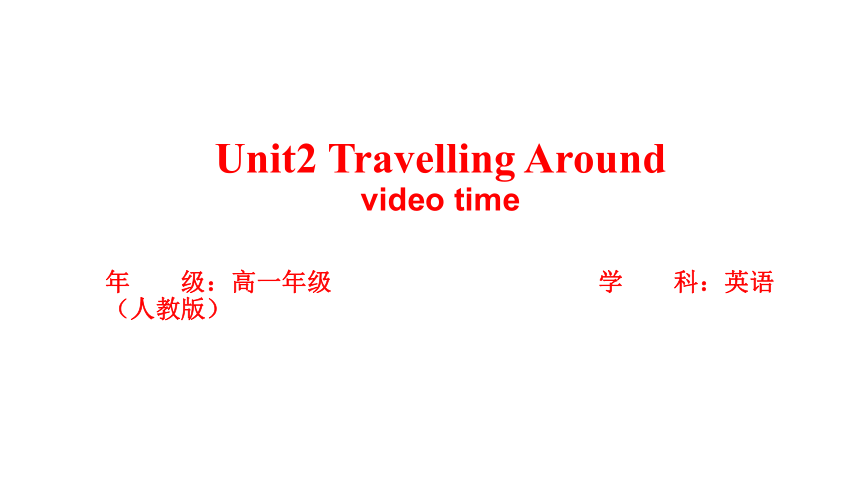
|
|
| 格式 | pptx | ||
| 文件大小 | 147.4MB | ||
| 资源类型 | 教案 | ||
| 版本资源 | 人教版(2019) | ||
| 科目 | 英语 | ||
| 更新时间 | 2024-04-10 00:00:00 | ||
图片预览

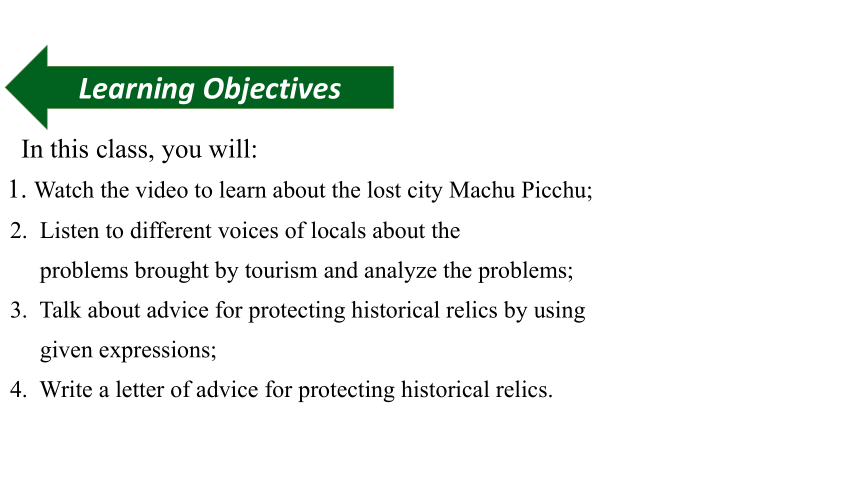
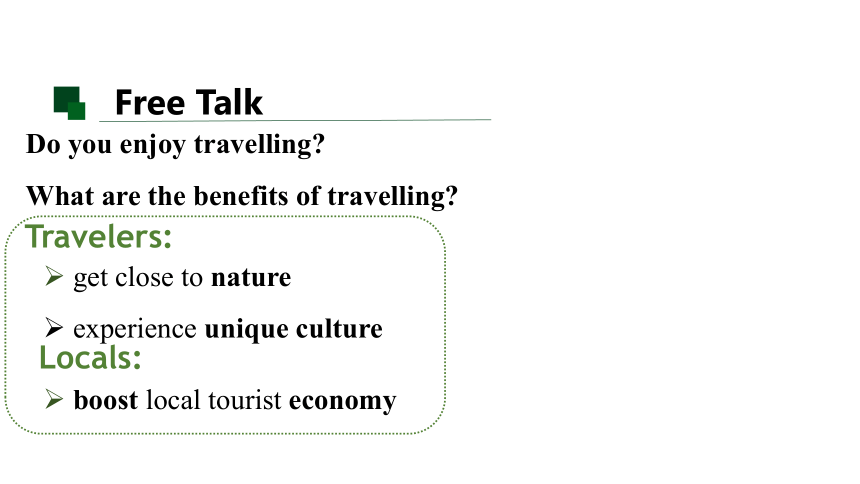
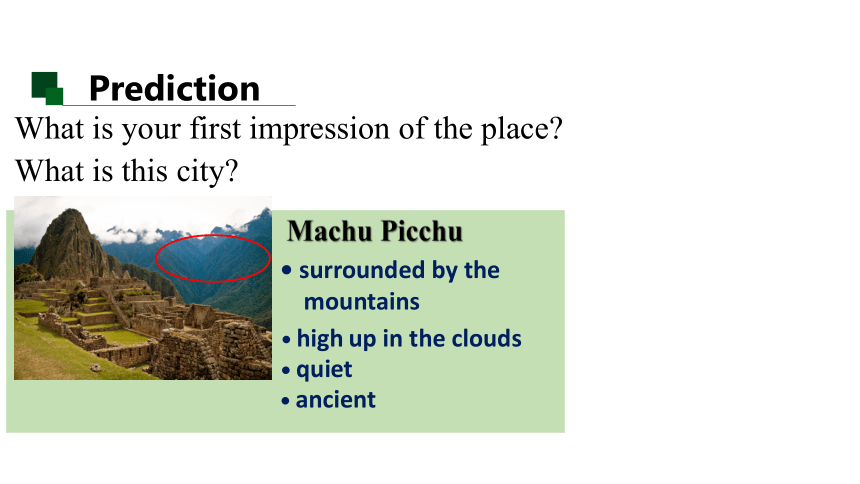
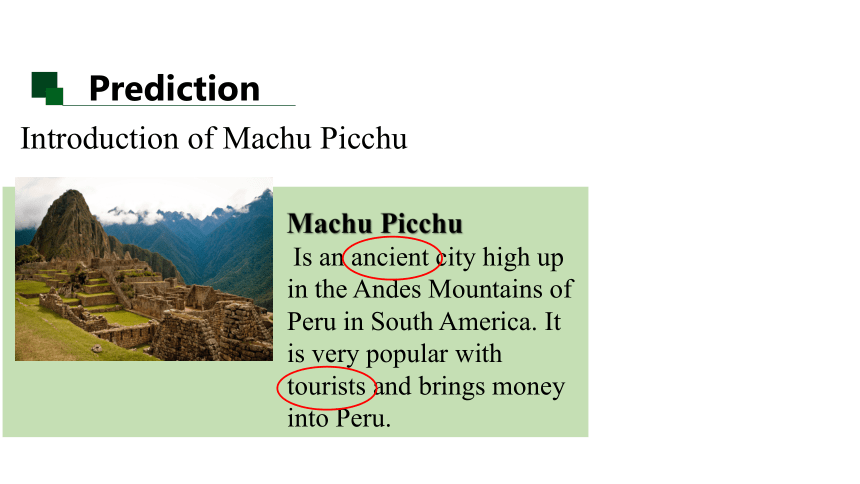
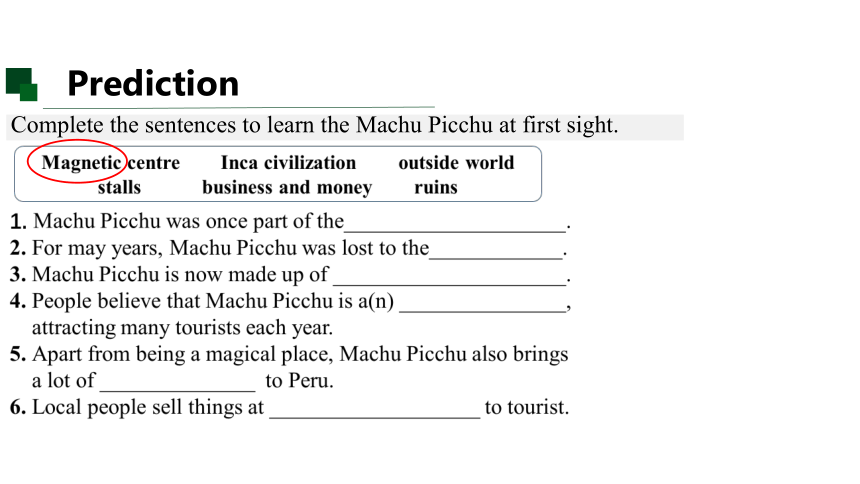
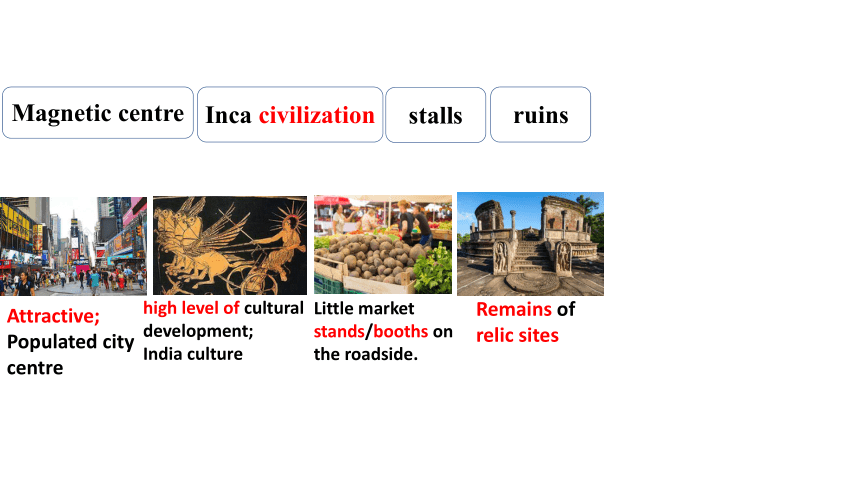
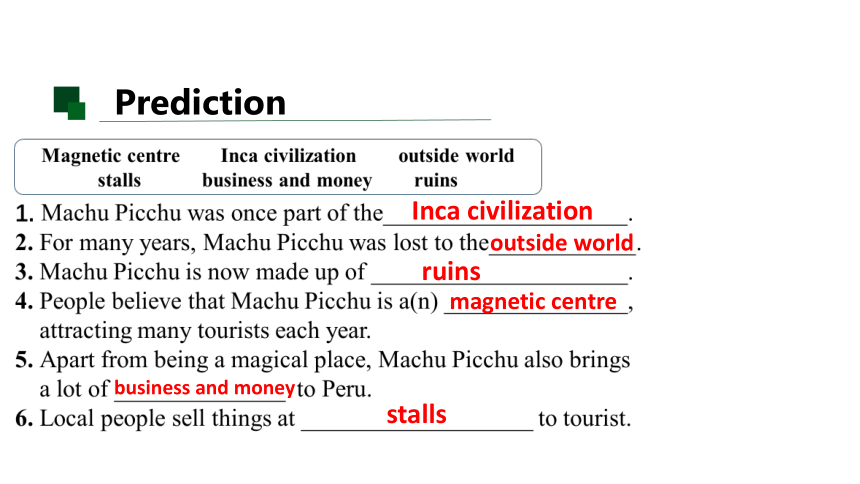
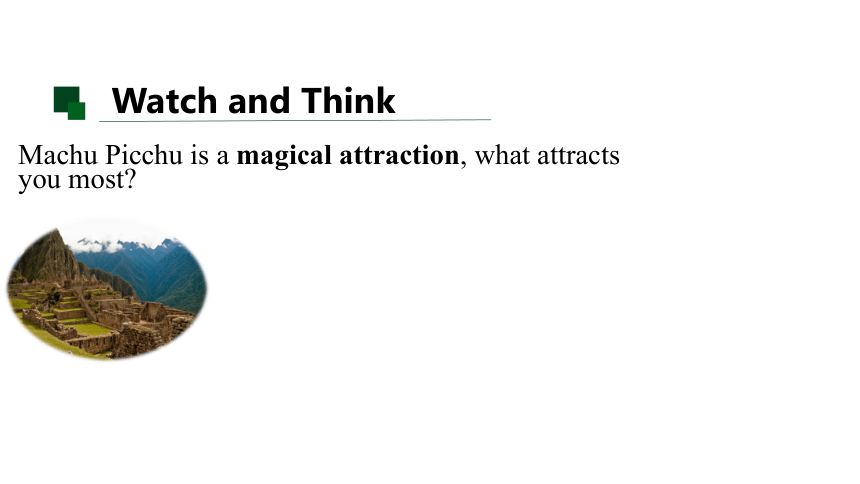
文档简介
(共26张PPT)
Unit2 Travelling Around
video time
年 级:高一年级 学 科:英语(人教版)
Learning Objectives
1. Watch the video to learn about the lost city Machu Picchu;
2. Listen to different voices of locals about the
problems brought by tourism and analyze the problems;
3. Talk about advice for protecting historical relics by using
given expressions;
4. Write a letter of advice for protecting historical relics.
In this class, you will:
Do you enjoy travelling
What are the benefits of travelling
Travelers:
Locals:
get close to nature
experience unique culture
Free Talk
boost local tourist economy
Prediction
What is your first impression of the place
What is this city
Machu Picchu
surrounded by the
mountains
high up in the clouds
quiet
ancient
Introduction of Machu Picchu
Machu Picchu
Is an ancient city high up in the Andes Mountains of Peru in South America. It is very popular with tourists and brings money into Peru.
Prediction
Prediction
Complete the sentences to learn the Machu Picchu at first sight.
Magnetic centre
Attractive;
Populated city centre
high level of cultural development;
India culture
Little market stands/booths on
the roadside.
Remains of relic sites
Inca civilization
ruins
stalls
Prediction
Inca civilization
outside world
ruins
magnetic centre
business and money
stalls
Machu Picchu is a magical attraction, what attracts you most
Watch and Think
Video Time
Machu Picchu is a magical attraction, what attracts you most
Watch and Think
its natural scenery
unique India culture
More than 500 years old
Nearly 8,000 feet up in the Andes
Watch and Answer
What is another name for Machu Picchu
Why did Machu Picchu get this name
Who found this city again and when was it found
Video Time
What is another name for Machu Picchu
Why did Machu Picchu get this name
Question and Answer
The Lost City of the Inca
The end of the Inca civilization
Who found this city again and when was it found
The discovery of the lost city
On 24 July, 1911, a young American archeologist named Hiram Bingham found this lost Inca city.
Question and Answer
How do locals in Peru feel about the discovery There are two different voices about tourism in Machu Picchu. What are they
Video Time
Question and Answer
Some feel grateful because more tourists mean more business and money.
Some are worried that too many tourists will harm environment.
How do locals in Peru feel about the discovery There are two different voices about tourism in Machu Picchu. What are they
What conflicts are raised here
What conflicts are raised here
Tour guide, Julio
Hotel owner, Jose
Machu Picchu should be shared;
Some conservationists:
Question and Answer
The locals at Aguas Calientes
against tourism: harm environment
develop tourism: boost economy
Against tourism
Support tourism
Debate
Make Machu Picchu world-renowned, no longer lost;
Bring business and money to Peru;
Make Inca civilization appreciated by the whole world.
Bring about the heavy burden of the local traffic;
Disturb the peaceful life of the local people;
Cause environmental issues.
Should tourism be stopped in places like Machu Picchu
Why or why not
Thinking
“The Lost City is no longer lost. Tourists have found it. The modern world is coming closer to this ancient world every day.” How do you understand it?
The Modern world
the Lost City
Tourism
Are there any other places like Machu Picchu in China
In what ways are they alike
Discussion
The Ancient city of Loulan
Discussion
Are there any other places like Machu Picchu
The capital of State Loulan,
disappeared after 800 years.
The ancient walled city of Gaochang
Near Turpan, Xinjiang. Once thriving, then destroyed by war in the 14th century.
Discussion
In what ways are they alike
The Ancient city of Loulan
The ancient walled city of Gaochang
The lost city Machu Picchu
How to balance tourism and the problems to further protect
these historical sites?
Set related laws and policies / education
Develop awareness of protection/ behave well
Promote related protection activities:
volunteer work; “Green tourism” program
Further thinking
Suggestion expressions: why not…/… is highly recommended/
… is advisable / I suggest that…
Government
Tourists
Locals
Homework
Read the editorial Be A Good Tourist in workbook and write a letter of advice to travel lovers in 80 words about how to further protect historical relic sites.
Unit2 Travelling Around
video time
年 级:高一年级 学 科:英语(人教版)
Learning Objectives
1. Watch the video to learn about the lost city Machu Picchu;
2. Listen to different voices of locals about the
problems brought by tourism and analyze the problems;
3. Talk about advice for protecting historical relics by using
given expressions;
4. Write a letter of advice for protecting historical relics.
In this class, you will:
Do you enjoy travelling
What are the benefits of travelling
Travelers:
Locals:
get close to nature
experience unique culture
Free Talk
boost local tourist economy
Prediction
What is your first impression of the place
What is this city
Machu Picchu
surrounded by the
mountains
high up in the clouds
quiet
ancient
Introduction of Machu Picchu
Machu Picchu
Is an ancient city high up in the Andes Mountains of Peru in South America. It is very popular with tourists and brings money into Peru.
Prediction
Prediction
Complete the sentences to learn the Machu Picchu at first sight.
Magnetic centre
Attractive;
Populated city centre
high level of cultural development;
India culture
Little market stands/booths on
the roadside.
Remains of relic sites
Inca civilization
ruins
stalls
Prediction
Inca civilization
outside world
ruins
magnetic centre
business and money
stalls
Machu Picchu is a magical attraction, what attracts you most
Watch and Think
Video Time
Machu Picchu is a magical attraction, what attracts you most
Watch and Think
its natural scenery
unique India culture
More than 500 years old
Nearly 8,000 feet up in the Andes
Watch and Answer
What is another name for Machu Picchu
Why did Machu Picchu get this name
Who found this city again and when was it found
Video Time
What is another name for Machu Picchu
Why did Machu Picchu get this name
Question and Answer
The Lost City of the Inca
The end of the Inca civilization
Who found this city again and when was it found
The discovery of the lost city
On 24 July, 1911, a young American archeologist named Hiram Bingham found this lost Inca city.
Question and Answer
How do locals in Peru feel about the discovery There are two different voices about tourism in Machu Picchu. What are they
Video Time
Question and Answer
Some feel grateful because more tourists mean more business and money.
Some are worried that too many tourists will harm environment.
How do locals in Peru feel about the discovery There are two different voices about tourism in Machu Picchu. What are they
What conflicts are raised here
What conflicts are raised here
Tour guide, Julio
Hotel owner, Jose
Machu Picchu should be shared;
Some conservationists:
Question and Answer
The locals at Aguas Calientes
against tourism: harm environment
develop tourism: boost economy
Against tourism
Support tourism
Debate
Make Machu Picchu world-renowned, no longer lost;
Bring business and money to Peru;
Make Inca civilization appreciated by the whole world.
Bring about the heavy burden of the local traffic;
Disturb the peaceful life of the local people;
Cause environmental issues.
Should tourism be stopped in places like Machu Picchu
Why or why not
Thinking
“The Lost City is no longer lost. Tourists have found it. The modern world is coming closer to this ancient world every day.” How do you understand it?
The Modern world
the Lost City
Tourism
Are there any other places like Machu Picchu in China
In what ways are they alike
Discussion
The Ancient city of Loulan
Discussion
Are there any other places like Machu Picchu
The capital of State Loulan,
disappeared after 800 years.
The ancient walled city of Gaochang
Near Turpan, Xinjiang. Once thriving, then destroyed by war in the 14th century.
Discussion
In what ways are they alike
The Ancient city of Loulan
The ancient walled city of Gaochang
The lost city Machu Picchu
How to balance tourism and the problems to further protect
these historical sites?
Set related laws and policies / education
Develop awareness of protection/ behave well
Promote related protection activities:
volunteer work; “Green tourism” program
Further thinking
Suggestion expressions: why not…/… is highly recommended/
… is advisable / I suggest that…
Government
Tourists
Locals
Homework
Read the editorial Be A Good Tourist in workbook and write a letter of advice to travel lovers in 80 words about how to further protect historical relic sites.
